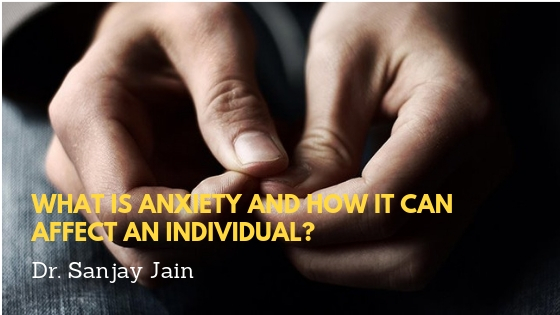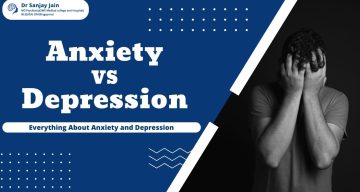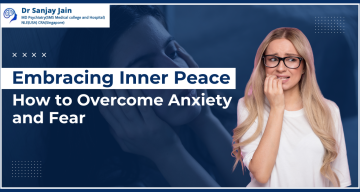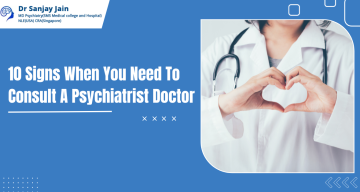
What Is Anxiety And How It Can Affect An Individual?
Anxiety is a feeling of nervousness, unease or worry that typically occurs in the absence of a possible threat. It differs from fear, which is the body’s natural response to upcoming danger.
Anxiety is part of the body’s natural reaction to stress, so it’s helpful sometimes, making you alert and ready for action. But there can be serious anxiety issues that can be hazardous. This is one problem that should not be ignored and paid heed to at once. You can consult the best psychiatrist in Jaipur for the treatment.
Anxiety disorders and usual feelings of anxiousness are two different things. When feelings of fear or nervousness become excessive, difficult to control or interfere with daily life, an anxiety disorder may occur. Anxiety disorders are one of the most common mental illness. Common anxiety signs and symptoms include:
-
- Feeling nervous, restless or tense
- Having a sense of possible danger or panic
- Having an increased heart rate
- Breathing rapidly
- Sweating
- Trembling
- Feeling weak or tired
- Trouble concentrating or thinking about anything other than the present problems and worries
- Having trouble in sleeping
- Experiencing gastrointestinal problems
- Having difficulty controlling worry
- Having the urge to avoid things that provoke anxiety
Types of anxiety that can affect the body:
Phobias
These include fear of tight spaces (claustrophobia), fear of heights (acrophobia), and many more. You may have a powerful urge to avoid the object or situation you are afraid of.
Panic Disorder
This causes panic attacks, involuntary feelings of anxiety, terror. Some physical symptoms include heart palpitations, chest pain and shortness of breath. These attacks may occur any time of the day. You can also experience another type of anxiety disorder along with panic disorder.
Central nervous system
Long-term anxiety and panic attacks can cause your brain to release stress hormones on a regular interval of time. This can enhance the frequency of symptoms such as headaches, dizziness, and depression. When you feel anxious and stressed, your brain floods your nervous system with hormones and chemicals designed to help you respond to danger. Adrenaline rush and cortisol are two examples.
The occasional high-stress event, long-term exposure to stress hormones can be more harmful to your physical health. It can leave a long term effect on your body. For example, cortisol can contribute to weight gain.
Cardiovascular system
Anxiety disorders can result in rapid heart rate, palpitations, and chest pain. You may also be at risk of high blood pressure and heart disease. If you are already suffering from heart disease, anxiety disorders may raise the risk of coronary events.
Excretory and digestive systems
Anxiety affects your excretory and digestive systems. You may have stomach aches, nausea, diarrhea, and some more digestive issues. Loss of appetite can also occur if you are suffering from it. There may be a connection between anxiety disorders. It can development of irritable bowel syndrome (IBS) after a stomach infection. IBS can result in vomiting, diarrhea, or constipation.
Immune system
Anxiety can trigger your flight-or-fight stress response. It also releases a flood of chemicals and hormones in your body, like adrenaline, into your system. In the short term of time, this may increase your pulse and breathing rate, so that your brain can get more oxygen. This prepares your body to respond appropriately to an intense situation. Your immune system may even get a little boost. With occasional stress, your body will return to the normal functioning when the stress passes.
But if you continuously feel anxious and stressed or it lasts a long time, your body never gets the signal to return to normal functioning. This can weaken your immune system, leaving you more sensitive to viral infections and frequent illnesses. Your regular vaccines may not work if you are suffering from anxiety disorder.
Respiratory system
Anxiety causes rapid and shallow breathing. If you have the chronic obstructive pulmonary disease (COPD), you may be at risk of hospitalization from anxiety-related complications. Anxiety can make asthma symptoms worse. If you are facing the same problem you should immediately consult a good psychiatrist in Jaipur.
Some Other effects:
-
- Headaches
- Muscle tension
- Insomnia
- Depression
- Social Isolation
There is no way to predict anxiety, but take precautions:
Get help early
Anxiety, like many other mental health conditions, can be harder to treat if you wait for a long period of time.
Stay active
Participate in activities that you enjoy and that makes you feel good about your body and yourself. Enjoy social interaction and caring relationships, which can lessen your worries and cherish your mood.
Avoid alcohol or drug use
Alcohol and drug use can cause or even increase anxiety. Are addicted to any of these substances, quitting is hard and can make you anxious. If you can’t quit on your own, consult a psychiatrist in Jaipur.
If you still feel even the slightest symptoms of anxiety, you should consult the best psychiatrist in Jaipur Dr. Sanjay Jain. Stay Happy And Stay Fit!

Dr. Sanjay Jain is a highly qualified and one of the best psychiatrist in Jaipur, India, with over 13 years of experience. He earned his medical degrees from SMS Medical College and Hospital. Dr. Jain is known for his global research work on mental health. He believes in not just using medicine but also educating and working with patients to find the best treatment plan. He was recognized as one of Jaipur’s top psychiatrists in 2020 by threebestrated.com, a trusted US-based ranking company.



